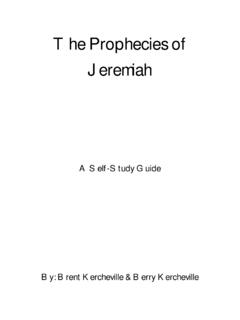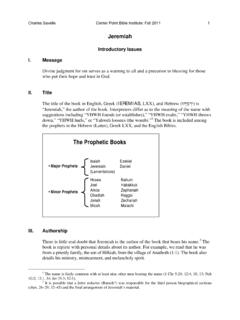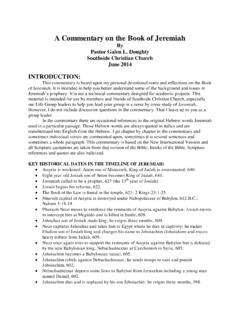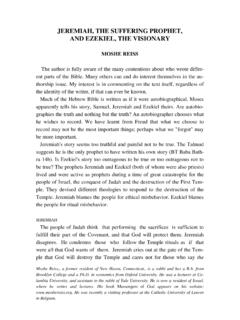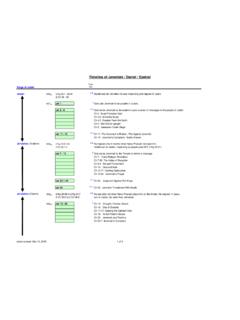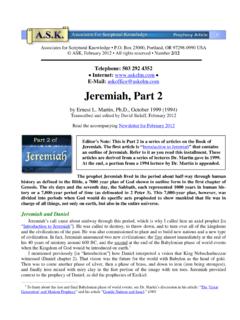Transcription of NOTES ON THE FUTURE OF DAMASCUS ACCORDING TO …
1 1 NOTES ON THE FUTURE OF DAMASCUS ACCORDING TO BIBLE PROPHECY Joel C. Rosenberg [Updated: September 9, 2013] Over the past several years, I have been repeatedly asked whether the Bible speaks to the FUTURE of Syria. Pastors and other Christian leaders have asked. So have a number of leaders and those from other countries. In 2012, for example, a prominent Member of Congress asked to meet with me in Washington, I thought the topic was going to be the possible coming war between Israel and Iran. Instead, the Representative asked, What are your thoughts on Isaiah 17 and the possible destruction of DAMASCUS ? A few months ago, a Member of the Canadian Parliament asked me the same question. As the implosion of Syria accelerates, the question of what Bible prophecy says about the FUTURE of Syria is being asked more frequently. During the horrific civil war that is underway there, more than 110,000 Syrians have been killed thus far, including, reportedly, through the use of chemical weapons in DAMASCUS .
2 More than two million Syrians have fled their country. Another five million more Syrians have been internally displaced they have fled their homes and villages because of the brutal violence, but have not yet actually left their country. The country is steadily falling apart and there is a real question how in the world Syria would ever be put back together. The larger question is whether the situation will actually go from bad to worse. Does the Bible predict the catastrophic destruction of DAMASCUS ? If so, why, and how will it happen? What are the implications of such a thing happening? How should Christians live in light of such coming events, if they are legitimate? These are questions I have been studying for some time. In March of 2013, my most recent novel, DAMASCUS Countdown, was published. It considers this very subject, the coming judgment of the Syrian capital, and how this scenario could possibly unfold in the not-too-distant FUTURE in relation to other Bible prophecies and current geopolitical trends in the Middle East.
3 Given how often I m being asked to discuss this, I have decided to post my personal study NOTES on this subject. I hope they are helpful. 1. There are two major passages in the Bible that deal with the FUTURE of DAMASCUS . a. The first is found in Isaiah 17, notably verses one through three, which foretells the destruction of DAMASCUS in the last days, prior to the Day of the Lord. 2 b. The second is found in jeremiah 49:23-27, which also foretells the destruction of DAMASCUS prior to the Day of the Lord. 2. First, some background: DAMASCUS is the capital of the Republic of Syria with some million residents, and a greater metropolitan area of about five million people. 3. DAMASCUS is described by historians as one of the oldest continuously inhabited cities on the planet. Other ancient cities include Jericho (in the West Bank), Sidon (in Lebanon), and Byblos (also in Lebanon). DAMASCUS is also considered the oldest capital city. a. The Encyclopedia Britannica, for example, NOTES : Many scholars believe that, among the ancient cities of the world, DAMASCUS is perhaps the oldest continuously inhabited.
4 Over the centuries, DAMASCUS has been conqueror and conquered, wealthy and destitute, and capital of empire and small states. b. The World Heritage Convention, a project of the United Nations, NOTES : Founded in the 3rd millennium , DAMASCUS was an important cultural and commercial centre, by virtue of its geographical position at the crossroads of the orient and the occident, between Africa and Asia. The old city of DAMASCUS is considered to be among the oldest continually inhabited cities in the world. Excavations at Tell Ramad on the outskirts of the city have demonstrated that DAMASCUS was inhabited as early as 8,000 to 10,000 BC. However, it is not documented as an important city until the arrival of the Aramaeans. In the Medieval period, it was the centre of a flourishing craft industry, with different areas of the city specializing in particular trades or DAMASCUS is considered to be the oldest city as well as the oldest capital of the world. It is the cradle of historical civilizations, constituting a beacon of science and art over time, and a historical encyclopaedia which tells a great part of the history of humanity.
5 In the same way, it represents a historical reference for comparing the systems of architecture and town planning over several thousand years. 4. The city of DAMASCUS is mentioned 56 times in the New American Standard Bible. a. DAMASCUS is first mentioned in the Bible in Genesis 14:15. Here s the passage in context: When Abram heard that his relative [Lot] had been taken captive, he led out his trained men, born in his house, three hundred and eighteen, and went in pursuit as far as Dan. He divided his forces against them by night, he and his servants, and defeated them, and pursued them as far as Hobah, which is north of DAMASCUS . He brought back all the goods, and also brought back his relative Lot with his possessions, and also the women, and the people. 3 b. Abraham s most trusted servant, Eliezer, is from DAMASCUS . We first learn about him in Genesis 15:2. c. King David conquered DAMASCUS and the Aramaens and built garrisons for his troops in DAMASCUS in 2 Samuel 8.
6 D. In 2 Kings 5, we read that Naaman, a captain in the army of Aram, comes to Elisha the prophet of Israel to be healed of leprosy, but is initially enraged when he s told to wash himself in the Jordan River, saying, Are rivers of DAMASCUS better than all the waters of Israel? Could I not wash in them and be clean? e. In the New Testament, of course, we learn in Acts 9 that Saul the Pharisee is heading from Jerusalem to DAMASCUS to arrest and persecute followers of Jesus Christ. It is on the road to DAMASCUS that Saul receives his famous vision of Jesus Christ. Saul is then led to DAMASCUS and fasts for three days in DAMASCUS in the home of Judas on Straight Street. A disciple of Jesus Christ named Ananias then receives a vision from Christ telling him to go heal Saul of blindness, which he obeys and then baptizes Saul. Then Saul begins preaching the gospel to the Jewish people in DAMASCUS and has to escape from DAMASCUS because of threats against his life. f. The last time DAMASCUS is mentioned in the New Testament in in Galatians 1:17 as the Apostle Paul describes his testimony and NOTES that he later returned to DAMASCUS to serve the Lord.
7 5. What does the prophecy concerning the FUTURE of DAMASCUS as described by the Hebrew prophet Isaiah tell us? An important key to interpreting Isaiah chapter 17 is in understanding that the context of the passage is End Times matters in chapters 11 through 24, Isaiah is writing about the coming of the Messiah, the Lord s FUTURE judgment of the Gentile nations who are historic enemies of Israel, and the reign of the Messiah on earth during the Millennial Kingdom. a. In Isaiah 11 and 12, the Hebrew prophet describes the coming of the Messiah, the judgment of the nations that He will bring, the Messiah s reign during the Millennial Kingdom all of which are End Times matters. i. The prophet speaks of the coming judgment of the nations [W]ith righteousness He will judge the poor, and decide with fairness for the afflicted of the earth; and He will strike the earth with the rod of His mouth, and with the breath of His lips He will slay the wicked. (11:4) ii. The prophet discusses how the Lord will assemble the banished ones of Israel and will gather the dispersed of Judah from the four 4 corners of the earth back to Israel, including from Syria, Lebanon and Kurdistan (Assyria), Egypt, Iran (Elam), Iraq (Shinar) and from the islands of the sea.
8 (11:11-12). iii. The prophet describes the dramatically changed order of nature during the Millennial Kingdom And the wolf will dwell with the lamb, and the leopard will lie down with the young nursing child will play by the hole of the (11:6, 8) iv. The prophet describes the peace and unity that will exist in the Millennial Kingdom between Assyria, Egypt and Israel (11:16), in a passage that echoes Isaiah 19. v. There will be much rejoicing in the End of Days when the Lord judges the wicked and comforts His people and brings salvation (chapter 12). b. In Isaiah 13 to Isaiah 24, the Lord speaks directly to the FUTURE of Gentile nations near or surrounding Israel. These prophecies are also End Times matters that is, they are events that will take place just before the Tribulation, or during the Tribulation, and come to complete fulfillment on or about the Day of the Lord (the literal, physical Second Coming of the Lord Jesus Christ). c. We know these are End Times prophecies and not near-term prophecies that would take place during Isaiah s lifetime or even in the generations that would immediately follow because of the numerous eschatological references that Isaiah makes.
9 I. In Isaiah 13, we read about the coming judgment/destruction of Babylon. But the context makes it clear that the prophecies will happen deep in the End Times, just prior to the Second Coming of Christ. In Isaiah 13:6, for example, we read, Wail, for the Day of the Lord is near! In Isaiah 13:9, we read, Behold, the Day of the Lord is coming. Both of these references indicate that the prophecies concerning the destruction of Babylon will occur in the last days leading up to the Day of the Lord, an eschatological biblical term that refers to the actual, literal, physical return of Christ to earth at the end of the Tribulation. ii. In Isaiah 19, the Lord speaks of an End Times judgment of Egypt, followed by a great salvation of the Egyptian people, and describes a highway between Egypt, Assyria and Israel that will bring Jews and Arabs to Jerusalem to worship the Lord in the Millennial Kingdom. 5 iii. In Isaiah 24:3-6 we read about the horrors of the Tribulation, The earth will be completely laid waste and completely despoiled, for the Lord has spoken His word.
10 The earth mourns and withers, the world fades and withers, the exalted of the people of the earth fade away. The earth is also polluted by its inhabitants, for they transgressed laws, violated statutes, broke the everlasting covenant. Therefore, a curse devours the earth, and those who live in it are held guilty. Therefore, the inhabitants of the earth are burned, and few men are left. iv. In Isaiah 24:23, we read of the Second Coming of Christ, Then the moon will be abashed and the sun ashamed, for the Lord of hosts will reign on Mount Zion and in Jerusalem, and His glory will before His elders. v. This entire section Isaiah 13 to 24 is, therefore, about End Times events. The fact that the prophecy concerning DAMASCUS occurs in Isaiah 17, indicates that it, too, is an End Times prophecy. d. It is worth noting that Dr. Dwight Pentecost, the renowned professor of eschatology at Dallas Theological Seminary, wrote in his 1958 book, Things To Come: A Study In Biblical Eschatology, the following: There is a divine program for the Gentile nations that is to come to fulfillment in the tribulation has a program with the Gentile nations, leading to their salvation and blessing in the [including] the judgments upon nations adjacent to Israel.
